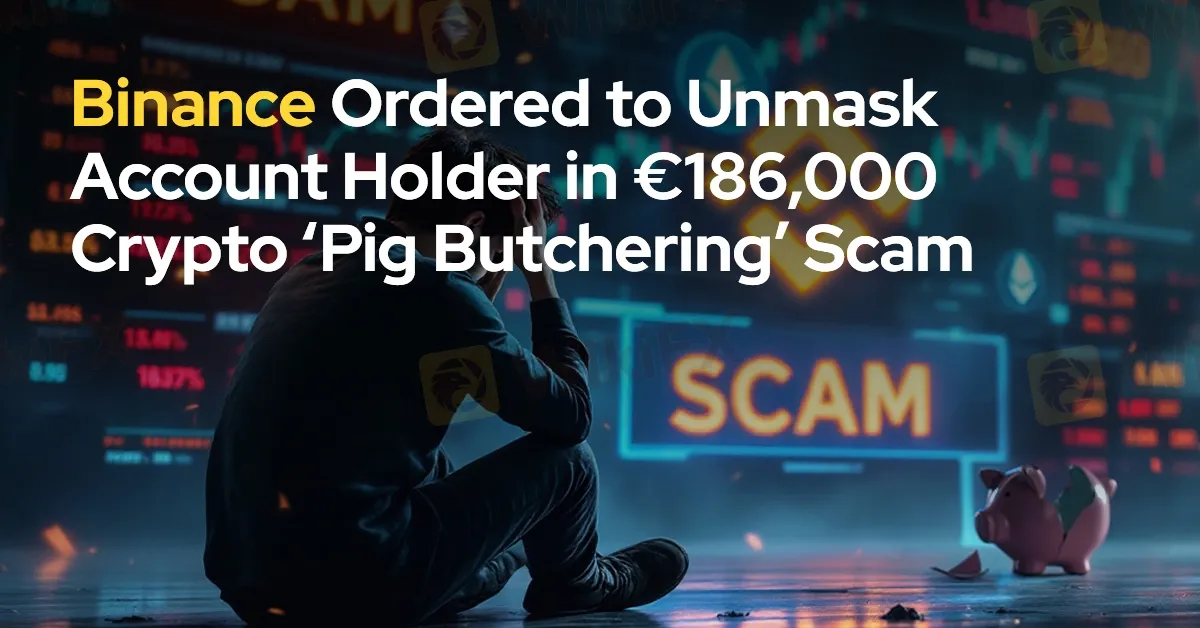简体中文
繁體中文
English
Pусский
日本語
ภาษาไทย
Tiếng Việt
Bahasa Indonesia
Español
हिन्दी
Filippiiniläinen
Français
Deutsch
Português
Türkçe
한국어
العربية
Binance Ordered to Unmask Account Holder in €186,000 Crypto ‘Pig Butchering’ Scam
Abstract:In a significant ruling, a court in The Hague has ordered the cryptocurrency exchange Binance to disclose personal information of an account holder implicated in a major dating app scam. This directive follows a case involving a Dutch woman who fell victim to a “pig butchering” scam, leading to a loss of nearly €186,000 (approximately $200,000 USD) in what she believed to be a legitimate cryptocurrency investment.

In a significant ruling, a court in The Hague has ordered the cryptocurrency exchange Binance to disclose personal information of an account holder implicated in a major dating app scam. This directive follows a case involving a Dutch woman who fell victim to a “pig butchering” scam, leading to a loss of nearly €186,000 (approximately $200,000 USD) in what she believed to be a legitimate cryptocurrency investment.
The case began when the woman, who met her scammer on a dating app, was gradually persuaded over time to invest substantial sums of money in a supposed cryptocurrency opportunity. Over six separate transactions, she transferred a total of €186,000, believing it would yield considerable returns. Only after realising she had been deceived did she report the crime to Dutch authorities and enlist the help of a private investigation firm to trace her funds.

Investigators successfully tracked a portion of the stolen funds to an account on Binance, one of the world‘s largest cryptocurrency exchanges. Although Binance subsequently froze the account, the exchange refused to release any information about the account holder, citing its privacy policy and the need for a court order. In response, the victim’s legal team sought judicial intervention to uncover the scammer‘s identity, arguing that justice in this case outweighed privacy considerations. The Dutch court ruled in favour of the victim, mandating that Binance disclose the scammer’s full name and address within 14 days. Furthermore, the court extended the freeze on the account for four weeks, allowing the victim time to consider additional legal actions.
This ruling highlights a growing legal expectation for cryptocurrency platforms to cooperate in fraud investigations, especially as regulatory scrutiny increases across global jurisdictions. In recent months, both the U.S. Securities and Exchange Commission (SEC) and the Commodity Futures Trading Commission (CFTC) have intensified their efforts to combat crypto-related fraud schemes, including so-called pig butchering scams.
Pig butchering scams involve fraudsters cultivating relationships with victims, often via dating apps or social media. The scammer initially encourages small investments with promises of high returns, gradually building trust before persuading the victim to invest large amounts. Once significant funds are secured, the scammer vanishes, leaving the victim with nothing.
This case underscores the ongoing tension between privacy protection and regulatory compliance in the cryptocurrency industry. As regulatory bodies increase oversight, exchanges like Binance face mounting pressure to work alongside authorities to prevent and address fraudulent activities. Compliance with such legal directives may strengthen trust in crypto platforms but also raises complex privacy issues.
Ultimately, this Dutch court decision serves as a reminder to crypto platforms about their role in combating fraud and highlights the increasing regulatory obligations they face.

Disclaimer:
The views in this article only represent the author's personal views, and do not constitute investment advice on this platform. This platform does not guarantee the accuracy, completeness and timeliness of the information in the article, and will not be liable for any loss caused by the use of or reliance on the information in the article.
Read more

Russia to Fully Ban Crypto Mining in 10 Regions Starting January 1, 2025
Starting from January 1, 2025, Russia will implement a comprehensive ban on cryptocurrency mining in 10 regions for a period of six years. The ban will remain in effect until March 15, 2031.

Malaysia’s Crypto Landscape: Adapting Amidst Global Ambitions
The United States is intensifying its efforts to become a global cryptocurrency hub under President-elect Donald Trump. Experts believe this move could prompt countries, including Malaysia, to reassess their regulatory approaches toward digital assets.

SEC Approves Hashdex and Franklin Crypto ETFs on Nasdaq
The SEC has approved crypto index ETFs by Hashdex and Franklin Templeton, including Bitcoin and Ethereum, marking a milestone in crypto asset investment.

North Korean Hackers Steal $1.3bn in Cryptocurrency in 2024
Over $2.2bn in cryptocurrency stolen in 2024, with North Korean hackers accounting for $1.3bn. Discover how cyber theft impacts the evolving crypto landscape.
WikiFX Broker
Latest News
ASIC Sues Binance Australia Derivatives for Misclassifying Retail Clients
WikiFX Review: Is FxPro Reliable?
Malaysian-Thai Fraud Syndicate Dismantled, Millions in Losses Reported
Trading frauds topped the list of scams in India- Report Reveals
AIMS Broker Review
The Hidden Checklist: Five Unconventional Steps to Vet Your Broker
Russia to Fully Ban Crypto Mining in 10 Regions Starting January 1, 2025
YAMARKETS' Jingle Bells Christmas Offer!
Why is there so much exposure against PrimeX Capital?
Doo Financial Expands Regulatory Reach with Offshore Licenses in BVI and Cayman Islands
Currency Calculator


